Looking for the best online programming courses for this year? While there are a variety of platforms out there, two you may have heard of are Udacity and Zenva – both geared towards helping you develop your skills to become a hobbyist or professional programmer in a variety of different fields. As you can imagine, both platforms offer different experiences that may help or hinder how you learn a programming language.
In this article, we will be exploring Zenva vs Udacity in a variety of categories regarding price, instructor and course quality, accessibility, and more. Through these pros and cons, you should have the information needed to make an informed decision about which platform is right for you and take your ability to learn coding to a new level.
Table of contents
Instructors and Quality Standards
Having instructors who know their stuff and quality video production are both important for a good e-Learning experience, so let’s dive into how Udacity and Zenva deal with quality standards in these regards.
Udacity:
Udacity very stringently vets both their instructors and technical mentors, even requiring assessment tests in some cases to ensure they’re experts in their fields. Additionally, Udacity’s own video production team is on hand as well, able to help new instructors polish their video content.
Once videos are created, Udacity provides further quality testing as well, having another team iterate through the content to test for errors and suggest edits to ensure the highest course quality possible for their students before the course is released.
Ultimately, Udacity provides a high-quality experience through their collaborative efforts.
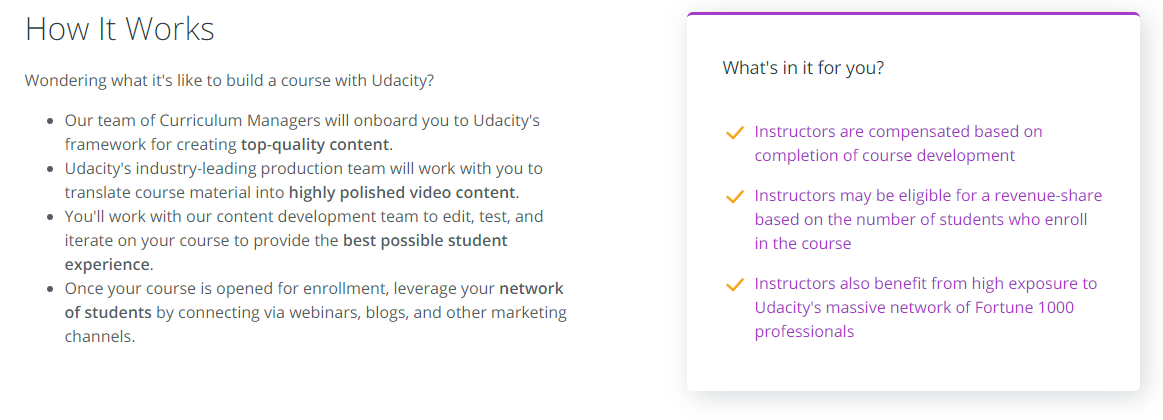
Zenva:
Zenva also vets their instructors fairly heavily during the hiring process. While not necessarily requiring assessment tests, Zenva does have fewer instructors, allowing them to provide more attention and assistance to each instructor. Additionally, Zenva also strives to work with instructors who are part of developer programs or are certified in some regard, ensuring that they’re getting experts involved in the teaching process.
Beyond this, Zenva checks over each video lesson to ensure audio quality, code size, and other elements are as high a quality as possible for students to learn from. Between this, and regular content reviews for relevancy, Zenva ensures course quality remains high throughout the course’s entire lifespan.
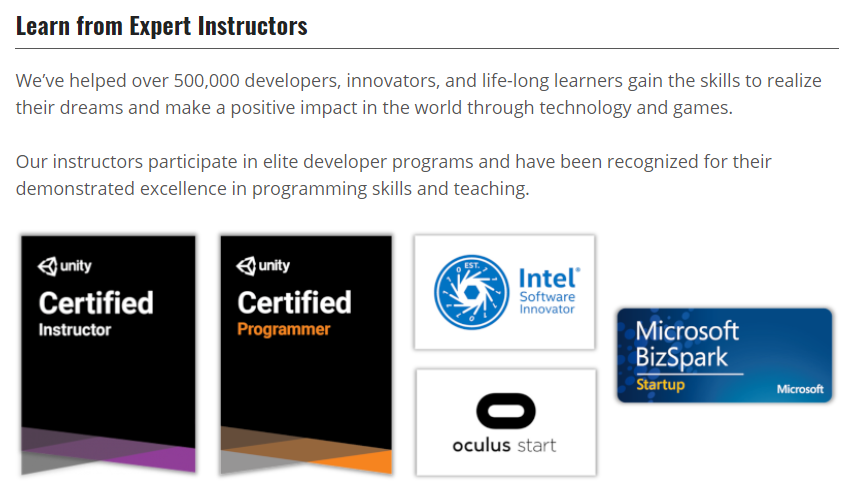
Verdict:
Udacity and Zenva both equally strive to ensure quality and that their courses are taught by experts, so it’s ultimately a tie. No matter the platform, you will be getting a worthwhile, quality experience and learn from the best.
Price
Compared to traditional institutions, online learning appeals to many users for being more reasonably priced for their budgets. Here, we’ll take a look at how much Udacity and Zenva cost and which offers a more valuable experience for your money.
Udacity:
As Udacity is more focused on professional development, it has the price to match. Programs can vary quite a bit, costing anywhere from $399/month to a flat price of $900+ for 4-6 months of access. Though the price comes with a lot of benefits, such as help from mentors, resume reviews, and more, most of these are geared towards those aiming to get hired or start a career – so these benefits may not appeal to hobbyists.
While Udacity does run deals, such as getting the first month free, overall it’s a very expensive option, especially for those just starting out.

Zenva:
Zenva’s main offering is their unlimited access plans, which are very affordable sitting at $20/month or $168 for a whole year of access. For this price, Zenva gives students access to not only their entire 200+ course catalog, but also their course support areas and free monthly updates that include new courses for all students enrolled. In the end, even if you only learn from 5 courses per month, you’d only be paying about $3/course.
In addition to this, Zenva also offers the ability to purchase individual courses for $50/course as a one-time fee, making it a great option if you only have a few courses you want to learn from.

Verdict:
Though Udacity has some great benefits, Zenva wins by a mile for being a far more affordable option and providing equal quality value for the price.
Course Relevance
Given that technology rapidly improves every month, having the latest information regarding frameworks and similar is important for staying up-to-date with the industry. In this next part, we will explore how Udacity and Zenva stay on top of current trends and deal with outdated material.
Udacity:
Udacity is very on-top of offering the latest skills, covering newer technologies like self-driving cars or artificial intelligence. Given their review process and constant communication with their students, Udacity is also able to make sure that their courses are updated regularly with additional lessons to keep up-to-date on current developments.
This being said, we could not find an easy way to provide feedback to Udacity, outside of contacting their helpdesk, so how they determine when and what to update is unclear. Additionally, it is equally unclear what Udacity does regarding old programs and courses, or poorly reviewed programs, for students who enrolled.
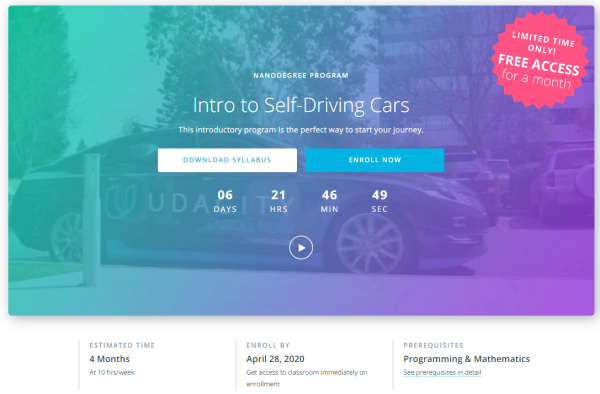
Zenva:
Zenva regularly creates new courses covering the latest trends, from the Godot game engine to the newest version of Tensorflow for machine learning. As students enrolled with the unlimited access plans receive these updates for free, they’re assured that they’ll always be able to stay current with industry technologies and keep up-to-date with their learning.
In addition to this, Zenva has a very clear Course Update Policy regarding how and when they choose to update or retire old courses – making sure students don’t receive misinformation regarding current practices. Beyond this, Zenva also makes it far easier to provide feedback and reports, and as these are reviewed regularly, students can know the company is listening and making sure outdated content is addressed as soon as possible.

Verdict:
Ultimately, it is a very narrow tie, as both Udacity and Zenva do update courses, follow trends, and make sure students have experiences relevant to the industry. However, Udacity’s lack of transparency regarding updates is something to bear in mind, especially given the cost.
Course Variety
In the end, it all may come down to whether Udacity or Zenva offers the sorts of courses you want to learn from. As such, we’ll next take a look at the courses in terms of variety on each platform.
Udacity:
Udacity offers courses in several different verticals, including artificial intelligence, data science, VR, web development, C++ programming, and so forth. While the platform does have a heavier emphasis on business programming with its Python-related course materials, there are a lot of programs to learn from.
Additionally, Udacity does have fairly unique courses not found anywhere else, such as niche topics like programming for smart homes. Thus, Udacity has quite a specialized variety, especially if it’s data science or machine learning related.

Zenva:
Zenva, too, has a wide variety of verticals, offering courses on data science, game development, web development, mobile development, and more. Even within these verticals, Zenva offers quite a bit of variety, covering a wide range of frameworks and engines – or even genres when it comes to game development.
There are also unique curriculums you won’t find on other platforms as well, such as their Godot Game Development Mini-Degree. Alhough there is a heavier emphasis on game development on the platform, there are plenty of courses to choose from for all areas of development – all of which include a wide range of projects that can be created with the material.
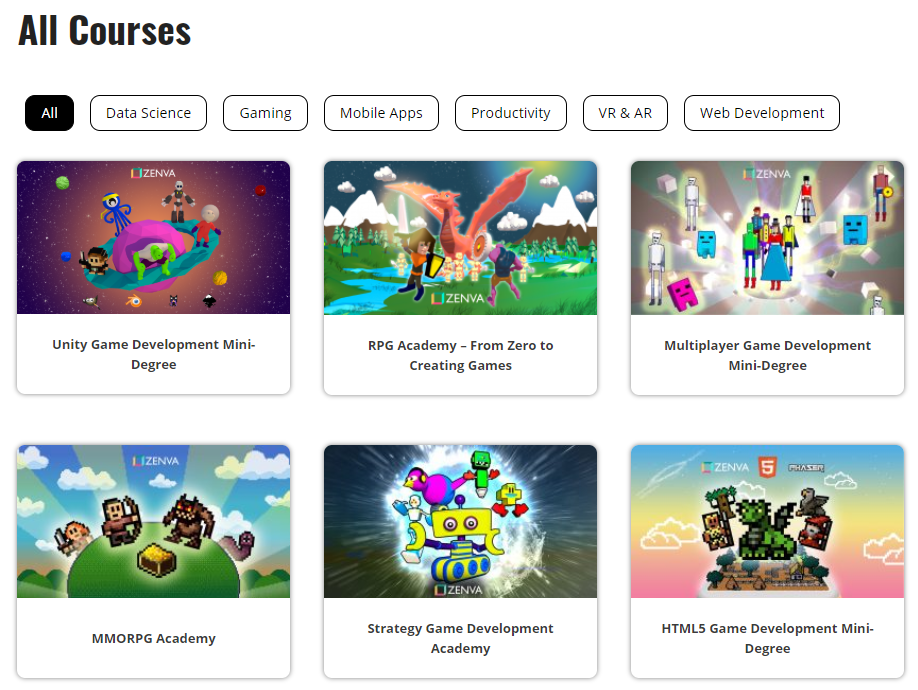
Verdict:
Udacity and Zenva both have fantastic variety, so this category is another tie. If you want to focus only on data science, Udacity might be the better choice, whereas Zenva would be the clearer winner for game development. Ultimately, the right platform for you will be determined by which unique courses tickle your fancy more.
Professional Development
For many, learning programming is about developing their skills professionally so that they can boost their careers. So, how do Udacity and Zenva compare in regards to professional development?
Udacity:
As mentioned several times, Udacity’s primary focus is for students looking to boost their careers. In that light, they offer heaps of benefits towards that aim, including project reviews, resume assistance, and even contacts to help students find new jobs. Udacity makes the entire process quite easy, and truly offers a fantastic package if you want guidance at every step.
In addition to this, Udacity takes a project-based approach, so you will learn how to build real-world projects to build your portfolio as you develop your professional skills.
This being said, though, we are unable to confirm if the results are better or comparable to hiring a third party consultant, as Udacity’s numerous success stories merely offer quotes as opposed to in-depth tales about what Udacity has done for its students.
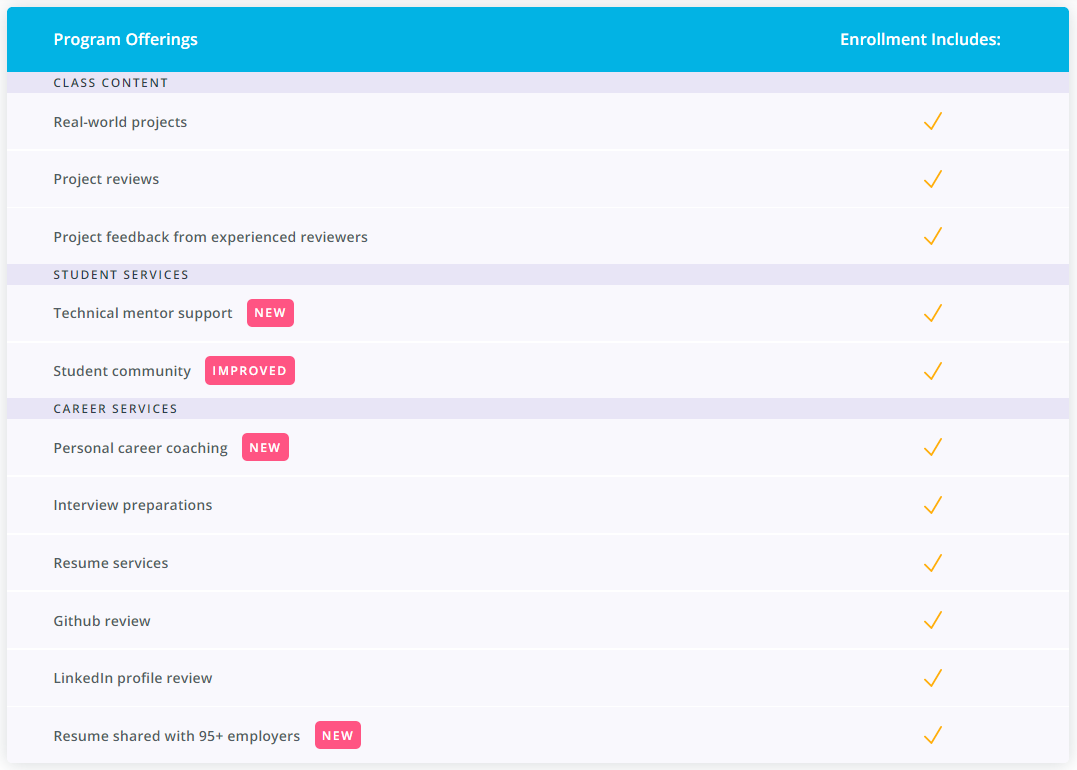
Zenva:
Unfortunately, Zenva does not offer comparable career benefits, as the company caters to hobbyists as well as professionals. However, like Udacity, Zenva also takes a project-based approach, allowing students to build tangible projects that can be used for their portfolio or expanded for their own project needs. Additionally, Zenva does offer personalized course completion certificates, helping students add credentials to their resumes if needed.
There is also something to be said for Zenva’s emphasis on self-teaching, as recent studies show at least 86.8% of pro developers are partially self-taught – meaning Zenva helps foster those sorts of self-teaching skills needed for professional industry work.
As a last note, as well, Zenva did offer more concrete learner success stories, so it was easier to see how students benefited from their courses and benefits.

Verdict:
If you’re looking for a new career or new job skills and want every ounce of help you can get possible, Udacity is the clear winner. Even so, Zenva is still a good choice if you’re on a budget, since they do offer some perks that will help guide you towards professional success.
Beginner Friendliness
For the last category, we’re going to take a look at how Udacity and Zenva compare when it comes to how beginner-friendly they are for those just getting started in programming.
Udacity:
Udacity offers quite a number of beginner courses, whether you want to dive into machine learning for the first time or learn something like business analysis. Udacity also had guided programs, each with a syllabus, that walks students through the learning process of their chosen focus and builds their skills up slowly.
That being said, Udacity has a much bigger emphasis on intermediate and advanced courses, meaning there is a lot of assumptions that you have some amount of experience. While this certainly may be the case for many professionals, it makes for an intimidating start for those just beginning their journey.
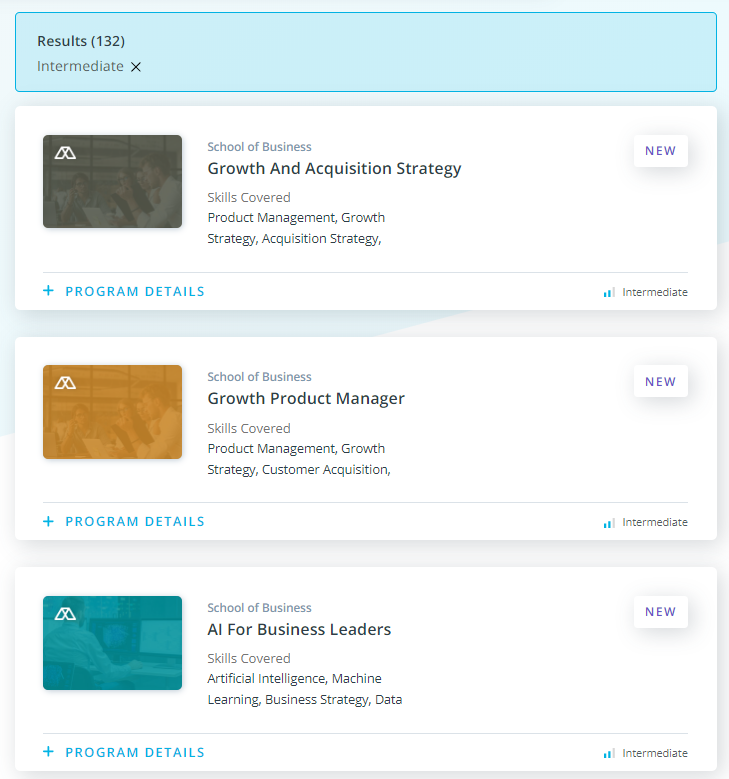
Zenva:
What Zenva might lack for in advanced courses, it makes up for with its plethora of courses for beginners. Whether you need to start with the fundamentals of Python or have never touched HTML in your life, Zenva has a course that will start you off with clear examples.
Additionally, Zenva also has a variety of curriculums available in its unlimited access plans that are designed specifically for beginners. These curriculums focus on fundamentals first and foremost before guiding students to intermediate topics, making them suitable for students who want to become skilled developers by the end, even with no prior coding experience.

Verdict:
Zenva is definitely the winner here if you’re a beginner. Though they offer a bit less in terms of more advanced courses compared to Udacity, the experience is overall more friendly and less intimidating, especially if you’re a hobbyist.
Overview:
All in all, the choice between Udacity and Zenva will depend on what you would like to learn and what you would like to get out of it. Due to its professional development benefits, Udacity is a great choice if you’re specifically looking to start a career in programming and are willing to put in the hefty time and money as an investment.
That being said, if you’re on a budget, need to learn on the go to suit your schedule, or simply are just starting out, Zenva is a far better choice. Not only will you still get some perks to help you enhance your professional skills if you would like, but you’ll ultimately get a great value for the price in ways that are comparable or better than Udacity.
For those looking for more recognized credentials, you can check out Udacity’s offerings here.
However, if you’re a beginner or simply want to learn professional-grade skills on a budget, you can find Zenva’s course here.
Still not sure which you prefer? You can also check out our Zenva vs. Udemy article for some more information to guide your learning path!






